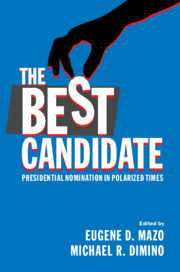Book contents
- The Best Candidate
- The Best Candidate
- Copyright page
- Dedication
- Contents
- Contributors
- Introduction
- 1 Presidential Selection: Historical, Institutional, and Democratic Perspectives
- 2 The Historical Development of the U.S. Presidential Nomination Process
- 3 Constitutional Law and the Presidential Nomination Process
- 4 Winnowing and Endorsing: Separating the Two Distinct Functions of Party Primaries
- 5 Simplifying Presidential Primaries
- 6 The Case for Standardizing Primary Voter Eligibility Rules
- 7 Primary Day: Why Presidential Nominees Should Be Chosen on a Single Day
- 8 A Eulogy for Caucuses
- 9 Floor Fight: Protecting the National Party Conventions from Manipulation
- 10 A Better Financing System? The Death and Possible Rebirth of the Presidential Nomination Public Financing Program
- 11 Campaign Finance Deregulation and the Hyperpolarization of Presidential Nominations in the Super PAC Era
- 12 Democratizing the Presidential Debates
- 13 The Influence of Technology on Presidential Primary Campaigns
- 14 Women and the Presidency
- 15 The Nomination of Presidential Candidates by Minor Political Parties
- 16 Reforming the Presidential Nominating Process: A Curmudgeon’s View
- Index
6 - The Case for Standardizing Primary Voter Eligibility Rules
Published online by Cambridge University Press: 10 September 2020
- The Best Candidate
- The Best Candidate
- Copyright page
- Dedication
- Contents
- Contributors
- Introduction
- 1 Presidential Selection: Historical, Institutional, and Democratic Perspectives
- 2 The Historical Development of the U.S. Presidential Nomination Process
- 3 Constitutional Law and the Presidential Nomination Process
- 4 Winnowing and Endorsing: Separating the Two Distinct Functions of Party Primaries
- 5 Simplifying Presidential Primaries
- 6 The Case for Standardizing Primary Voter Eligibility Rules
- 7 Primary Day: Why Presidential Nominees Should Be Chosen on a Single Day
- 8 A Eulogy for Caucuses
- 9 Floor Fight: Protecting the National Party Conventions from Manipulation
- 10 A Better Financing System? The Death and Possible Rebirth of the Presidential Nomination Public Financing Program
- 11 Campaign Finance Deregulation and the Hyperpolarization of Presidential Nominations in the Super PAC Era
- 12 Democratizing the Presidential Debates
- 13 The Influence of Technology on Presidential Primary Campaigns
- 14 Women and the Presidency
- 15 The Nomination of Presidential Candidates by Minor Political Parties
- 16 Reforming the Presidential Nominating Process: A Curmudgeon’s View
- Index
Summary
National convention delegates are chosen through a bewildering array of procedures that vary from state to state. Because states, for the most part, determine not only whether parties hold a primary or caucus, but also which voters are eligible to participate, delegates arrive at the national convention having been selected by very different constituencies that have very different policy ideas and very different levels of commitment to their respective parties.
The result is that neither the Republican Party nor the Democratic Party is able to express a clear ideological message through its presidential nominations. Presidential candidates seeking to win delegates in different state elections must appeal to the electorate in each state—and the state electorates differ greatly because the state-imposed voter eligibility rules differ greatly from state to state. As a result, candidates who articulate a clear and consistent message will draw different levels of support from the primary electorate in the various states, even when their messages appeal to similar proportions of party members and non-party members in each state.
Keywords
- Type
- Chapter
- Information
- The Best CandidatePresidential Nomination in Polarized Times, pp. 126 - 144Publisher: Cambridge University PressPrint publication year: 2020

